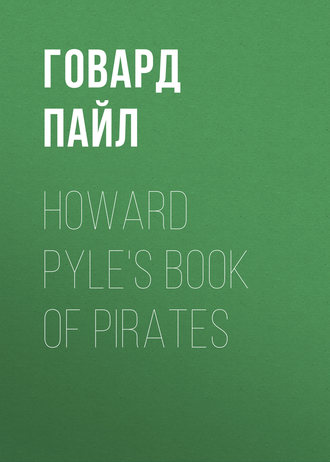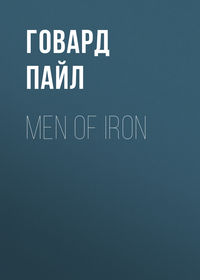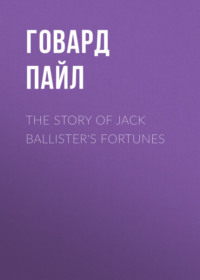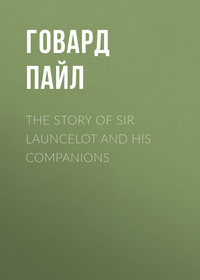 полная версия
полная версияHoward Pyle's Book of Pirates
The negro still sat by the chest where the two had left him, and so bright was the moonlight that from where he lay Tom could see the glint of it twinkling in the whites of his eyeballs.
Presently from behind the hill there came, for the third time, the sharp rapping sound of the mallet driving still another peg, and then after a while the two pirates emerged from behind the sloping whiteness into the space of moonlight again.
They came direct to where the chest lay, and the white man and the black man lifting it once more, they walked away across the level of open sand, and so on behind the edge of the hill and out of Tom's sight.
IIITom Chist could no longer see what the pirates were doing, neither did he dare to cross over the open space of sand that now lay between them and him. He lay there speculating as to what they were about, and meantime the storm cloud was rising higher and higher above the horizon, with louder and louder mutterings of thunder following each dull flash from out the cloudy, cavernous depths. In the silence he could hear an occasional click as of some iron implement, and he opined that the pirates were burying the chest, though just where they were at work he could neither see nor tell.
Still he lay there watching and listening, and by and by a puff of warm air blew across the sand, and a thumping tumble of louder thunder leaped from out the belly of the storm cloud, which every minute was coming nearer and nearer. Still Tom Chist lay watching.
Suddenly, almost unexpectedly, the three figures reappeared from behind the sand hill, the pirate captain leading the way, and the negro and white man following close behind him. They had gone about halfway across the white, sandy level between the hill and the hummock behind which Tom Chist lay, when the white man stopped and bent over as though to tie his shoe.
This brought the negro a few steps in front of his companion.
That which then followed happened so suddenly, so unexpectedly, so swiftly, that Tom Chist had hardly time to realize what it all meant before it was over. As the negro passed him the white man arose suddenly and silently erect, and Tom Chist saw the white moonlight glint upon the blade of a great dirk knife which he now held in his hand. He took one, two silent, catlike steps behind the unsuspecting negro. Then there was a sweeping flash of the blade in the pallid light, and a blow, the thump of which Tom could distinctly hear even from where he lay stretched out upon the sand. There was an instant echoing yell from the black man, who ran stumbling forward, who stopped, who regained his footing, and then stood for an instant as though rooted to the spot.
Tom had distinctly seen the knife enter his back, and even thought that he had seen the glint of the point as it came out from the breast.
Meantime the pirate captain had stopped, and now stood with his hand resting upon his cane looking impassively on.
Then the black man started to run. The white man stood for a while glaring after him; then he, too, started after his victim upon the run. The black man was not very far from Tom when he staggered and fell. He tried to rise, then fell forward again, and lay at length. At that instant the first edge of the cloud cut across the moon, and there was a sudden darkness; but in the silence Tom heard the sound of another blow and a groan, and then presently a voice calling to the pirate captain that it was all over.
He saw the dim form of the captain crossing the level sand, and then, as the moon sailed out from behind the cloud, he saw the white man standing over a black figure that lay motionless upon the sand.
Then Tom Chist scrambled up and ran away, plunging down into the hollow of sand that lay in the shadows below. Over the next rise he ran, and down again into the next black hollow, and so on over the sliding, shifting ground, panting and gasping. It seemed to him that he could hear footsteps following, and in the terror that possessed him he almost expected every instant to feel the cold knife blade slide between his own ribs in such a thrust from behind as he had seen given to the poor black man.
So he ran on like one in a nightmare. His feet grew heavy like lead, he panted and gasped, his breath came hot and dry in his throat. But still he ran and ran until at last he found himself in front of old Matt Abrahamson's cabin, gasping, panting, and sobbing for breath, his knees relaxed and his thighs trembling with weakness.
As he opened the door and dashed into the darkened cabin (for both Matt and Molly were long ago asleep in bed) there was a flash of light, and even as he slammed to the door behind him there was an instant peal of thunder, heavy as though a great weight had been dropped upon the roof of the sky, so that the doors and windows of the cabin rattled.
IVThen Tom Chist crept to bed, trembling, shuddering, bathed in sweat, his heart beating like a trip hammer, and his brain dizzy from that long, terror-inspired race through the soft sand in which he had striven to outstrip he knew not what pursuing horror.
For a long, long time he lay awake, trembling and chattering with nervous chills, and when he did fall asleep it was only to drop into monstrous dreams in which he once again saw ever enacted, with various grotesque variations, the tragic drama which his waking eyes had beheld the night before.
Then came the dawning of the broad, wet daylight, and before the rising of the sun Tom was up and out of doors to find the young day dripping with the rain of overnight.
His first act was to climb the nearest sand hill and to gaze out toward the offing where the pirate ship had been the day before.
It was no longer there.
Soon afterward Matt Abrahamson came out of the cabin and he called to Tom to go get a bite to eat, for it was time for them to be away fishing.
All that morning the recollection of the night before hung over Tom Chist like a great cloud of boding trouble. It filled the confined area of the little boat and spread over the entire wide spaces of sky and sea that surrounded them. Not for a moment was it lifted. Even when he was hauling in his wet and dripping line with a struggling fish at the end of it a recurrent memory of what he had seen would suddenly come upon him, and he would groan in spirit at the recollection. He looked at Matt Abrahamson's leathery face, at his lantern jaws cavernously and stolidly chewing at a tobacco leaf, and it seemed monstrous to him that the old man should be so unconscious of the black cloud that wrapped them all about.
When the boat reached the shore again he leaped scrambling to the beach, and as soon as his dinner was eaten he hurried away to find the Dominie Jones.
He ran all the way from Abrahamson's hut to the parson's house, hardly stopping once, and when he knocked at the door he was panting and sobbing for breath.
The good man was sitting on the back-kitchen doorstep smoking his long pipe of tobacco out into the sunlight, while his wife within was rattling about among the pans and dishes in preparation of their supper, of which a strong, porky smell already filled the air.
Then Tom Chist told his story, panting, hurrying, tumbling one word over another in his haste, and Parson Jones listened, breaking every now and then into an ejaculation of wonder. The light in his pipe went out and the bowl turned cold.
"And I don't see why they should have killed the poor black man," said Tom, as he finished his narrative.
"Why, that is very easy enough to understand," said the good reverend man. "'Twas a treasure box they buried!"
In his agitation Mr. Jones had risen from his seat and was now stumping up and down, puffing at his empty tobacco pipe as though it were still alight.
"A treasure box!" cried out Tom.
"Aye, a treasure box! And that was why they killed the poor black man. He was the only one, d'ye see, besides they two who knew the place where 'twas hid, and now that they've killed him out of the way, there's nobody but themselves knows. The villains – Tut, tut, look at that now!" In his excitement the dominie had snapped the stem of his tobacco pipe in two.
"Why, then," said Tom, "if that is so, 'tis indeed a wicked, bloody treasure, and fit to bring a curse upon anybody who finds it!"
"'Tis more like to bring a curse upon the soul who buried it," said Parson Jones, "and it may be a blessing to him who finds it. But tell me, Tom, do you think you could find the place again where 'twas hid?"
"I can't tell that," said Tom, "'twas all in among the sand humps, d'ye see, and it was at night into the bargain. Maybe we could find the marks of their feet in the sand," he added.
"'Tis not likely," said the reverend gentleman, "for the storm last night would have washed all that away."
"I could find the place," said Tom, "where the boat was drawn up on the beach."
"Why, then, that's something to start from, Tom," said his friend. "If we can find that, then maybe we can find whither they went from there."
"If I was certain it was a treasure box," cried out Tom Chist, "I would rake over every foot of sand betwixt here and Henlopen to find it."
"'Twould be like hunting for a pin in a haystack," said the Rev. Hilary Jones.
As Tom walked away home, it seemed as though a ton's weight of gloom had been rolled away from his soul. The next day he and Parson Jones were to go treasure-hunting together; it seemed to Tom as though he could hardly wait for the time to come.
VThe next afternoon Parson Jones and Tom Chist started off together upon the expedition that made Tom's fortune forever. Tom carried a spade over his shoulder and the reverend gentleman walked along beside him with his cane.
As they jogged along up the beach they talked together about the only thing they could talk about – the treasure box. "And how big did you say 'twas?" quoth the good gentleman.
"About so long," said Tom Chist, measuring off upon the spade, "and about so wide, and this deep."
"And what if it should be full of money, Tom?" said the reverend gentleman, swinging his cane around and around in wide circles in the excitement of the thought, as he strode along briskly. "Suppose it should be full of money, what then?"
"By Moses!" said Tom Chist, hurrying to keep up with his friend, "I'd buy a ship for myself, I would, and I'd trade to Injy and to Chiny to my own boot, I would. Suppose the chist was all full of money, sir, and suppose we should find it; would there be enough in it, d'ye suppose, to buy a ship?"
He poured it into the dish that the good man made of his hands, and the parson made a motion as though to empty it into his pocket. Then he stopped, as though a sudden doubt had occurred to him. "I don't know that 'tis fit for me to take this pirate money, after all," he said.
"But you are welcome to it," said Tom.
Still the parson hesitated. "Nay," he burst out, "I'll not take it; 'tis blood money." And as he spoke he chucked the whole double handful into the now empty chest, then arose and dusted the sand from his breeches. Then, with a great deal of bustling energy, he helped to tie the bags again and put them all back into the chest.
They reburied the chest in the place whence they had taken it, and then the parson folded the precious paper of directions, placed it carefully in his wallet, and his wallet in his pocket. "Tom," he said, for the twentieth time, "your fortune has been made this day."
And Tom Chist, as he rattled in his breeches pocket the half dozen doubloons he had kept out of his treasure, felt that what his friend had said was true.
As the two went back homeward across the level space of sand Tom Chist suddenly stopped stock-still and stood looking about him. "'Twas just here," he said, digging his heel down into the sand, "that they killed the poor black man."
"And here he lies buried for all time," said Parson Jones; and as he spoke he dug his cane down into the sand. Tom Chist shuddered. He would not have been surprised if the ferrule of the cane had struck something soft beneath that level surface. But it did not, nor was any sign of that tragedy ever seen again. For, whether the pirates had carried away what they had done and buried it elsewhere, or whether the storm in blowing the sand had completely leveled off and hidden all sign of that tragedy where it was enacted, certain it is that it never came to sight again – at least so far as Tom Chist and the Rev. Hilary Jones ever knew.
VIIThis is the story of the treasure box. All that remains now is to conclude the story of Tom Chist, and to tell of what came of him in the end.
He did not go back again to live with old Matt Abrahamson. Parson Jones had now taken charge of him and his fortunes, and Tom did not have to go back to the fisherman's hut.
Old Abrahamson talked a great deal about it, and would come in his cups and harangue good Parson Jones, making a vast protestation of what he would do to Tom – if he ever caught him – for running away. But Tom on all these occasions kept carefully out of his way, and nothing came of the old man's threatenings.
Tom used to go over to see his foster mother now and then, but always when the old man was from home. And Molly Abrahamson used to warn him to keep out of her father's way. "He's in as vile a humor as ever I see, Tom," she said; "he sits sulking all day long, and 'tis my belief he'd kill ye if he caught ye."
Of course Tom said nothing, even to her, about the treasure, and he and the reverend gentleman kept the knowledge thereof to themselves. About three weeks later Parson Jones managed to get him shipped aboard of a vessel bound for New York town, and a few days later Tom Chist landed at that place. He had never been in such a town before, and he could not sufficiently wonder and marvel at the number of brick houses, at the multitude of people coming and going along the fine, hard, earthen sidewalk, at the shops and the stores where goods hung in the windows, and, most of all, the fortifications and the battery at the point, at the rows of threatening cannon, and at the scarlet-coated sentries pacing up and down the ramparts. All this was very wonderful, and so were the clustered boats riding at anchor in the harbor. It was like a new world, so different was it from the sand hills and the sedgy levels of Henlopen.
Tom Chist took up his lodgings at a coffee house near to the town hall, and thence he sent by the postboy a letter written by Parson Jones to Master Chillingsworth. In a little while the boy returned with a message, asking Tom to come up to Mr. Chillingsworth's house that afternoon at two o'clock.
Tom went thither with a great deal of trepidation, and his heart fell away altogether when he found it a fine, grand brick house, three stories high, and with wrought-iron letters across the front.
The counting house was in the same building; but Tom, because of Mr. Jones's letter, was conducted directly into the parlor, where the great rich man was awaiting his coming. He was sitting in a leather-covered armchair, smoking a pipe of tobacco, and with a bottle of fine old Madeira close to his elbow.
Tom had not had a chance to buy a new suit of clothes yet, and so he cut no very fine figure in the rough dress he had brought with him from Henlopen. Nor did Mr. Chillingsworth seem to think very highly of his appearance, for he sat looking sideways at Tom as he smoked.
"Well, my lad," he said, "and what is this great thing you have to tell me that is so mightily wonderful? I got what's-his-name – Mr. Jones's – letter, and now I am ready to hear what you have to say."
But if he thought but little of his visitor's appearance at first, he soon changed his sentiments toward him, for Tom had not spoken twenty words when Mr. Chillingsworth's whole aspect changed. He straightened himself up in his seat, laid aside his pipe, pushed away his glass of Madeira, and bade Tom take a chair.
He listened without a word as Tom Chist told of the buried treasure, of how he had seen the poor negro murdered, and of how he and Parson Jones had recovered the chest again. Only once did Mr. Chillingsworth interrupt the narrative. "And to think," he cried, "that the villain this very day walks about New York town as though he were an honest man, ruffling it with the best of us! But if we can only get hold of these log books you speak of. Go on; tell me more of this."
When Tom Chist's narrative was ended, Mr. Chillingsworth's bearing was as different as daylight is from dark. He asked a thousand questions, all in the most polite and gracious tone imaginable, and not only urged a glass of his fine old Madeira upon Tom, but asked him to stay to supper. There was nobody to be there, he said, but his wife and daughter.
Tom, all in a panic at the very thought of the two ladies, sturdily refused to stay even for the dish of tea Mr. Chillingsworth offered him.
He did not know that he was destined to stay there as long as he should live.
"And now," said Mr. Chillingsworth, "tell me about yourself."
"I have nothing to tell, Your Honor," said Tom, "except that I was washed up out of the sea."
"Washed up out of the sea!" exclaimed Mr. Chillingsworth. "Why, how was that? Come, begin at the beginning, and tell me all."
Thereupon Tom Chist did as he was bidden, beginning at the very beginning and telling everything just as Molly Abrahamson had often told it to him. As he continued, Mr. Chillingsworth's interest changed into an appearance of stronger and stronger excitement. Suddenly he jumped up out of his chair and began to walk up and down the room.
"Stop! stop!" he cried out at last, in the midst of something Tom was saying. "Stop! stop! Tell me; do you know the name of the vessel that was wrecked, and from which you were washed ashore?"
"I've heard it said," said Tom Chist, "'twas the Bristol Merchant."
"I knew it! I knew it!" exclaimed the great man, in a loud voice, flinging his hands up into the air. "I felt it was so the moment you began the story. But tell me this, was there nothing found with you with a mark or a name upon it?"
"There was a kerchief," said Tom, "marked with a T and a C."
"Theodosia Chillingsworth!" cried out the merchant. "I knew it! I knew it! Heavens! to think of anything so wonderful happening as this! Boy! boy! dost thou know who thou art? Thou art my own brother's son. His name was Oliver Chillingsworth, and he was my partner in business, and thou art his son." Then he ran out into the entryway, shouting and calling for his wife and daughter to come.
So Tom Chist – or Thomas Chillingsworth, as he now was to be called – did stay to supper, after all.
This is the story, and I hope you may like it. For Tom Chist became rich and great, as was to be supposed, and he married his pretty cousin Theodosia (who had been named for his own mother, drowned in the Bristol Merchant).
He did not forget his friends, but had Parson Jones brought to New York to live.
As to Molly and Matt Abrahamson, they both enjoyed a pension of ten pounds a year for as long as they lived; for now that all was well with him, Tom bore no grudge against the old fisherman for all the drubbings he had suffered.
The treasure box was brought on to New York, and if Tom Chist did not get all the money there was in it (as Parson Jones had opined he would) he got at least a good big lump of it.
And it is my belief that those log books did more to get Captain Kidd arrested in Boston town and hanged in London than anything else that was brought up against him.
Chapter V
JACK BALLISTER'S FORTUNES
IWe, of these times, protected as we are by the laws and by the number of people about us, can hardly comprehend such a life as that of the American colonies in the early part of the eighteenth century, when it was possible for a pirate like Capt. Teach, known as Blackbeard, to exist, and for the governor and the secretary of the province in which he lived perhaps to share his plunder, and to shelter and to protect him against the law.
At that time the American colonists were in general a rough, rugged people, knowing nothing of the finer things of life. They lived mostly in little settlements, separated by long distances from one another, so that they could neither make nor enforce laws to protect themselves. Each man or little group of men had to depend upon his or their own strength to keep what belonged to them, and to prevent fierce men or groups of men from seizing what did not belong to them.
It is the natural disposition of everyone to get all that he can. Little children, for instance, always try to take away from others that which they want, and to keep it for their own. It is only by constant teaching that they learn that they must not do so; that they must not take by force what does not belong to them. So it is only by teaching and training that people learn to be honest and not to take what is not theirs. When this teaching is not sufficient to make a man learn to be honest, or when there is something in the man's nature that makes him not able to learn, then he only lacks the opportunity to seize upon the things he wants, just as he would do if he were a little child.
In the colonies at that time, as was just said, men were too few and scattered to protect themselves against those who had made up their minds to take by force that which they wanted, and so it was that men lived an unrestrained and lawless life, such as we of these times of better government can hardly comprehend.
The usual means of commerce between province and province was by water in coasting vessels. These coasting vessels were so defenseless, and the different colonial governments were so ill able to protect them, that those who chose to rob them could do it almost without danger to themselves.
So it was that all the western world was, in those days, infested with armed bands of cruising freebooters or pirates, who used to stop merchant vessels and take from them what they chose.
Each province in those days was ruled over by a royal governor appointed by the king. Each governor, at one time, was free to do almost as he pleased in his own province. He was accountable only to the king and his government, and England was so distant that he was really responsible almost to nobody but himself.
The governors were naturally just as desirous to get rich quickly, just as desirous of getting all that they could for themselves, as was anybody else – only they had been taught and had been able to learn that it was not right to be an actual pirate or robber. They wanted to be rich easily and quickly, but the desire was not strong enough to lead them to dishonor themselves in their own opinion and in the opinion of others by gratifying their selfishness. They would even have stopped the pirates from doing what they did if they could, but their provincial governments were too weak to prevent the freebooters from robbing merchant vessels, or to punish them when they came ashore. The provinces had no navies, and they really had no armies; neither were there enough people living within the community to enforce the laws against those stronger and fiercer men who were not honest.
After the things the pirates seized from merchant vessels were once stolen they were altogether lost. Almost never did any owner apply for them, for it would be useless to do so. The stolen goods and merchandise lay in the storehouses of the pirates, seemingly without any owner excepting the pirates themselves.
The governors and the secretaries of the colonies would not dishonor themselves by pirating upon merchant vessels, but it did not seem so wicked after the goods were stolen – and so altogether lost – to take a part of that which seemed to have no owner.
A child is taught that it is a very wicked thing to take, for instance, by force, a lump of sugar from another child; but when a wicked child has seized the sugar from another and taken it around the corner, and that other child from whom he has seized it has gone home crying, it does not seem so wicked for the third child to take a bite of the sugar when it is offered to him, even if he thinks it has been taken from some one else.
It was just so, no doubt, that it did not seem so wicked to Governor Eden and Secretary Knight of North Carolina, or to Governor Fletcher of New York, or to other colonial governors, to take a part of the booty that the pirates, such as Blackbeard, had stolen. It did not even seem very wicked to compel such pirates to give up a part of what was not theirs, and which seemed to have no owner.









